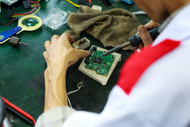How to Choose Soldering Courses and Technical Institutes In Georgia?
Posted by Staff - Soldertraining on Oct 1st 2022
Within larger degree and certificate programs in subjects like welding, HVAC, and electrical technology, which are frequently provided by vocational, technical, and community colleges, technicians and students can discover soldering classes. Additionally, some institutions provide stand-alone workforce training programs.
Soldering course selection criteria:
There are several variables to consider when evaluatingGeorgia solder traininginstitutes that provide soldering classes. To ensure that the rest of the curriculum aligns with their academic interests and career ambitions, students should remember that soldering courses typically provided can be part of larger associate's degree and certificate programs.
Finding out if a training institute prepares students for a certain professional certification exam, like the one provided by the Association of Connecting Electronics Industries, can be useful (IPC).
To ensure they have access to the most recent technologies for procedures like hand-soldering and surface mount soldering, prospective students may want to learn more about the school's hands-on training facilities.
Undergraduate certificate and degree programs in fields connected to soldering typically include a brief sequence of courses that expose students to the industry's fundamentals. They might also have education in interpreting blueprints or welding in addition to technical soldering instruction.
Graduates are normally qualified for entry-level technician work. Still, they may also be able to use the credits they acquire in the future to advance their education through higher degree programs.
Many associate's degree programs involve coursework in soldering; possible majors include electrical technology, HVAC, welding, and construction.
A soldering workforce training course is available for enrollment. These classes frequently don't involve lectures but focus exclusively on hands-on soldering instruction. They offer practical training for people who want to improve their soldering skills.
The soldering training organization must be well-known for its instructor-training programs and have trained numerous technicians from various firms for various IPC certification programs. Hand soldering, PCB rework, and wire and harness assembly are a few of the available courses.
The course and training must be taught by knowledgeable instructors who have used soldering techniques thousands of times in addition to their theoretical knowledge. These high standards for exercise will ensure that those who complete it can show their existing and potential clients that they have received advanced technical training.
The Georgia Soldering Institute prioritizes strict quality control procedures and provides students and technicians with all the necessary training tools.
A leader in IPC training technology must be the provider of soldering training and courses. It ought to be up to current with the most recent IPC changes. For instance, IPC- J-STD 001H, certified and launched in the fall of 2020, is one of the most recent standards to enter the market. For individuals involved in printed circuit assembly, it is a prerequisite standard.
Conclusion:
The provider of soldering training and courses in Georgia must ensure that their programs prioritize real-world experience and that students are certified after being judged on the caliber of their work.

